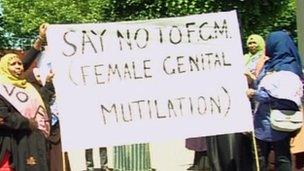Study will update female genital mutilation figures
- Published

In 2010 women demonstrated in Bristol against genital mutilation
Campaigners have announced a new study into the numbers of women in England and Wales who have undergone female genital mutilation.
The aim is to update a 2007 analysis which suggested more than 66,000 women had undergone a form of ritual cutting, with some 24,000 girls at risk.
The practice is illegal but persists in some communities.
Campaigner Efua Dorkenoo, of Equality Now, said better data would help the issue be taken more seriously.
The researchers hope that updated statistics will enable better care for women who have undergone ritual genital cutting and strengthen campaigns to prevent it.
Better estimates
"Because we currently don't have good data, it is very difficult for local authorities to know how women are affected in their areas," said Ms Dorkenoo.
Female genital mutilation (FGM) involves the partial or total removal of the female genital organs, sometimes only leaving a small hole for urination or menstruation.
Campaigners say some communities in the UK with origins in Africa, the Middle East or Asia believe it is a necessary part of becoming a woman, that it reduces female sex drive and therefore the chances of sex outside marriage.
The practice can be life-threatening and women who have been cut often experience pain during sexual intercourse and problems during child birth and menstruation.
The aim of the study is to gauge the proportion of adult women who have undergone ritual cutting and to provide better estimates of the numbers of girls who may be at risk.
The practice was made illegal in the UK in 1985 but campaigners say it still continues in secret with victims sometimes of primary-school age.
Last month the NSPCC launched a helpline aimed at anyone concerned about a child's welfare because of FGM, particularly teachers and medical staff, but they are also hoping that relatives may contact them.
The new research project will begin in October. It is co-funded by the Home Office and will draw on data from the 2011 Census and on figures from countries known to have high rates of female genital mutilation.
The research team, from Equality Now and City University's School of Health Sciences, will analyse up-to-date statistics on the prevalence of ritual cutting from these countries and compare these with immigration rates into the UK.
In the long term they hope also to gather data from maternity units on the numbers of pregnant women who have undergone FGM.
A Home Office spokesman said: "There is no justification for female genital mutilation. It is child abuse and it is illegal.
"FGM is a key focus in our cross-government action plan for tackling violence against women and girls and we are working with the Department for International Development and Department for Health to stamp out this abhorrent abuse.
"We have also agreed to help fund a new study into the prevalence of FGM in the UK.
"This crime has no place in our society. Political or cultural sensitivities must not get in the way of preventing FGM and finding and convicting those who carry it out."
- Published22 July 2013
- Published19 June 2013
- Published13 June 2013
- Published24 April 2013